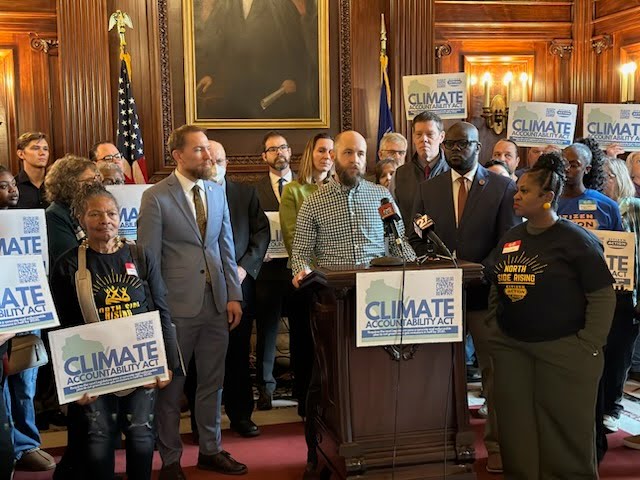Last month, I was invited to speak at a press conference alongside Wisconsinites from across the state for the launch of the Climate Accountability Act. At just sixty words, it’s a simple but powerful bill with the potential to make our communities healthier, advance racial equity, and drive our state’s economy forward:
In the 2025-26 legislative session, the legislature shall pass legislation creating a viable plan to reduce carbon emissions in this state by 52 percent by 2030 and creating a viable plan for achieving carbon neutral emissions in this state by 2050. Any plan enacted under this subsection shall maximize the impact of the plan on improving economic and racial equity.
The bill, introduced by State Representative Supreme Moore Omokunde and State Senator Chris Larson, creates an enforceable timeline with specific objectives, allowing flexibility for discussions of the various technology and policy approaches to come later. With nearly 20 legislative cosponsors and a broad coalition of partners—including the Union of Concerned Scientists (UCS)—signed on in support, Wisconsin has the unique chance to prove that states can, and should, take the lead in preparing communities for a more resilient future.
From technical details to personal stakes
As a Senior Energy Analyst with UCS, my work typically involves diving deep into the details of specific pieces of regulation and legislation in Wisconsin and surrounding states: working on comments about archaic electric metering requirements in Wisconsin, writing testimony about interconnection rules in Michigan, or modeling the role of energy storage in Illinois’ clean energy future.
So, when I first heard of the Climate Accountability Act—at a mere two sentences—I could have brushed it off as too high-level. Call me when we get to the nitty gritty! But in reality, as I pointed out in my remarks at the press conference launch, I have a huge stake in Wisconsin’s climate—this state is my home.
I came to Madison ten years ago to pursue a master’s in electrical engineering. Eventually, I met my wife, bought a home, and welcomed a son into the world who is now three years old. Madison is our home. That’s why I believe the Climate Accountability Act is a critical step for Wisconsin, especially given all the ways the federal government is trying to move us backward on addressing climate change.
The cost of inaction
In my own comments, I highlighted some of the ways that the lack of a climate plan affects Wisconsinites, drawing on my colleagues’ research. I highlighted the UCS analysis of the negative health and economic impacts of new fossil gas plants that We Energies is proposing in Oak Creek and Paris, WI.
My colleagues recently led an analysis showing that pollution from these proposed plants could result in nearly $6 billion of health and economic costs over their thirty year lifespan. That’s a big, scary number—but it translates to an even scarier reality: nearly 400 premature mortalities, 300 ER visits, and 900 new cases of asthma.
Since the press conference, our Wisconsin coalition partners RMI released additional analysis about the proposed Oak Creek plant finding that it will cost ratepayers more than $1.25 billion in higher energy costs compared to cleaner alternatives.
To underscore the negative impacts of fossil fuels on our grid, I also pointed to key research around resilience. In a study we completed last year, we found that during five major power outages around the U.S., gas plants were more likely to fail while resources like wind and solar helped keep the lights on.
While the Climate Accountability Act doesn’t directly address the proposed plants, the setting in which the utility proposed them is important to understand. Despite being one of the first states to enact a renewable portfolio standard (RPS) requiring 10% of the state’s energy to come from renewables, the requirement expired in 2015 with no meaningful updates since. And unlike most of our neighbors in the Midwest, Wisconsin is also unique in lacking a requirement for a detailed, public, forward-looking planning process known as integrated resource planning.
Within this context, Wisconsin utilities are unique in their dogged pursuit of new gas capacity—EIA data indicates that natural gas made up only 7% of U.S. planned capacity additions in 2025, with the bulk of these new plants planned for states without a current clean energy standard (the proposed Wisconsin plants won’t show up in the EIA data unless they are approved by the state). With a robust climate plan, Wisconsin utilities would have to look beyond their legacy preference for fossil fuels and consider cleaner, cheaper, and more reliable alternatives.
Climate change threatens Wisconsin’s future
While I focused on the energy sector in my comments, the impacts of climate change—and the importance of the climate accountability act—are far-reaching for Wisconsin and other Midwest states.
Our 2019 Killer Heat report found that without action on climate change, the number of days each year with a heat index over 100°F will jump 783%, from six to 53 in the Midwest. The impact will be felt most acutely by outdoor workers and vulnerable populations including children, the elderly, and those who are pregnant. The report also highlights how centuries of social and economic discrimination have increased the exposure of BIPOC communities and individuals to the risks of heat-related illnesses and injuries.
In 2020, we highlighted research finding that the combined effects of rising temperatures and increased CO2 concentrations lead to reduced yields from corn and soybean crops in the Midwest, harming local economies.
That’s just a handful of examples focused on the Midwest—at a higher level we know that climate change will also make winter storms worse, increase the risk of wildfires, and lead to more floods.
And, as the sponsors of the Climate Accountability Act recognized with the inclusion of the critical second sentence, these impacts will most acutely affect environmental justice communities and others who have been historically marginalized. Any plan addressing climate change in Wisconsin must focus on addressing these historic harms.

“The fierce urgency of now”
In his opening remarks at the press conference, the bill’s sponsor in the Assembly, Representative Supreme Moore-Omokunde, quoted the words of Martin Luther King Jr while reflecting on “the fierce urgency of now.” I’ll close with his call to action:
“We cannot continue to burn fossil fuels with no plans to seek alternatives that are best for urban and rural Wisconsinites. We must develop a plan now that centers racial and class equality, and gets us on a path to net zero.”
Click here to find out more about the bill and how you can support it.

